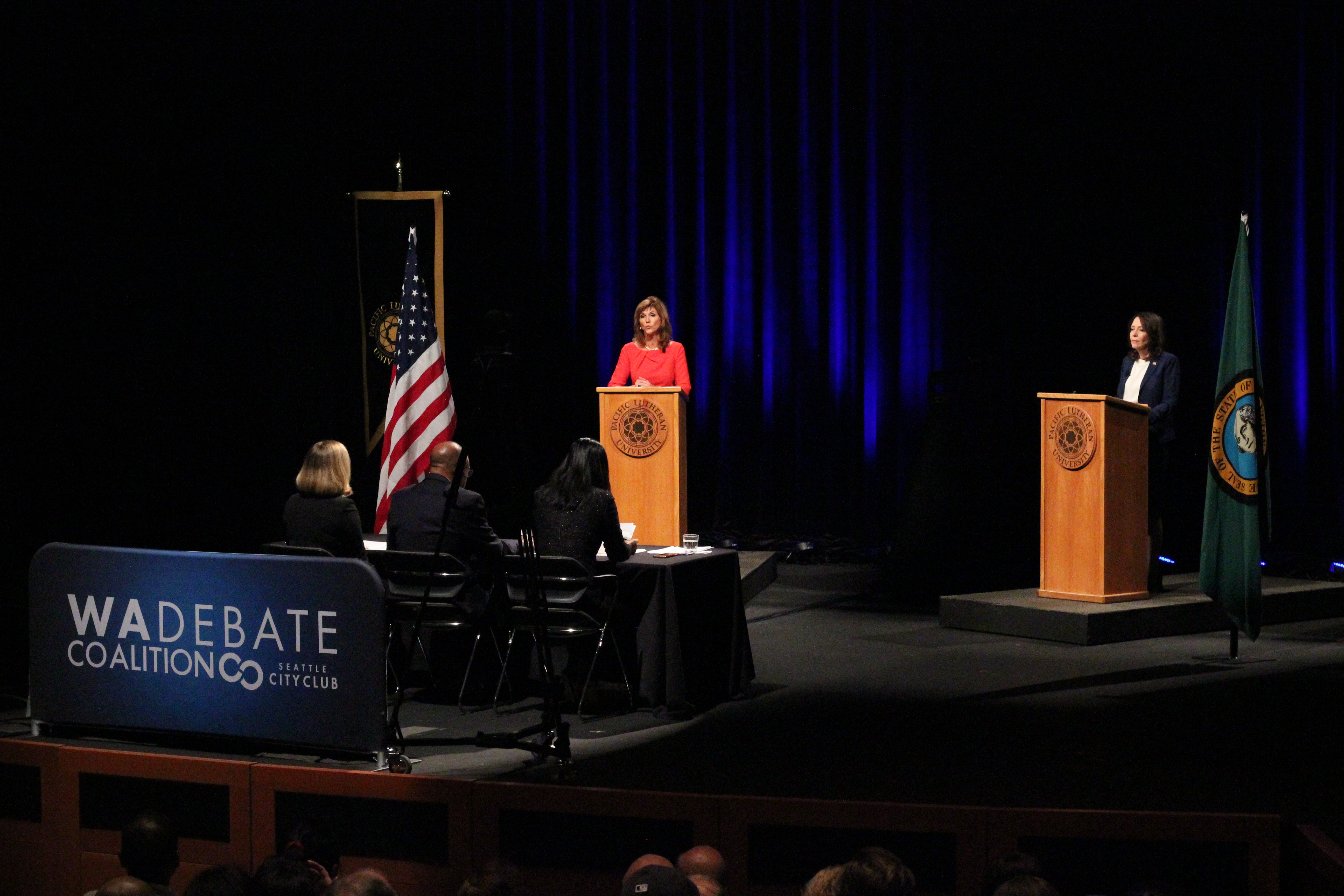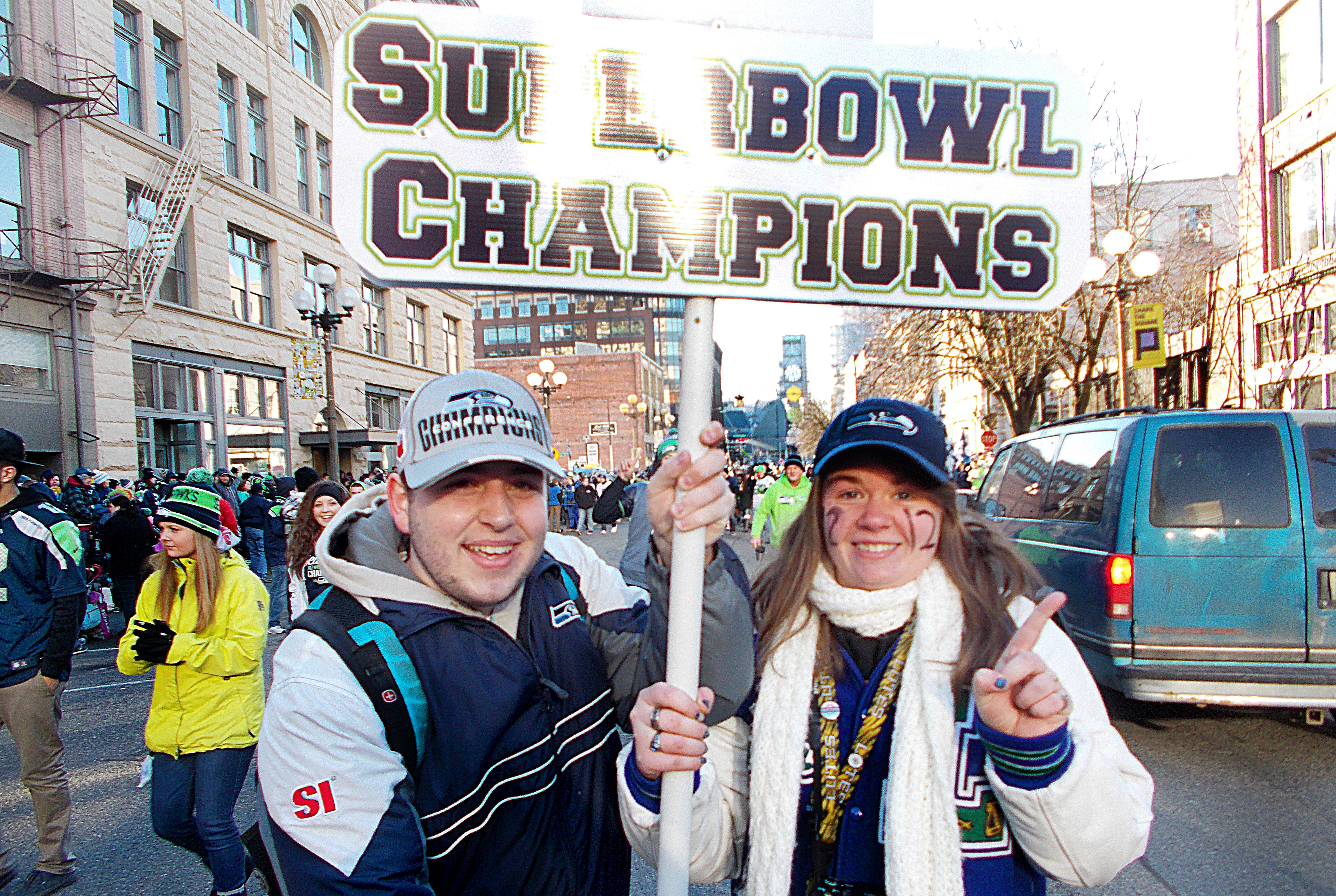By: Gurjot Kang and Raven Lirio
What do tax cuts, healthcare reform, immigration policy and hammers as assault weapons all have in common? The 2018 Washington State U.S. Senate debate at Pacific Lutheran University. The debate, originally scheduled for Saturday, October 6 at 7 p.m., was rescheduled to Monday, October 8 at 12:30 p.m. amid scheduling conflicts from Sen. Cantwell’s campaign.
Despite the overcast weather and delayed date, there was a special energy and buzz on-campus as students and Parkland residents gathered to watch the senate debate between incumbent Democratic U.S. Sen. Maria Cantwell and Republican frontrunner Susan Hutchison. The line outside the Karen Hille Phillips Center stretched past Red Square as folks anxiously waited to take their seats.
The debate, moderated by KOMO 4 News Anchor Mary Nam, Q13 News Correspondent Brandi Kruse, and KIRO 7 Reporter Essex Porter, began with both candidates were given 90-seconds to give their opening statements. Questions regarding a variety of issues were asked, and the candidates were each alloted 60-seconds to respond.
The first topic of the debate was one dwelling on the minds of many Americans: sexual assault in the #MeToo era.
Candidates were asked this starting question, “how do we treat sexual assault accusers with respect when they come forward while still protecting people from false allegations?”
In her answer, Hutchinson focused on her experiences with discrimination in theworkplace and fighting for equal pay as aformer television news anchor.
“I know the #MeToo movement. I was in television news for two decades. I understand fully what that means, and I was a victim of it as so many other women in the workplace,” said Hutchison.
While Hutchinson shared her life story, Cantwell took a different tone by emphasizing the struggles victims of sexual assault, especially Native American women, encounter in coming forward.
“We have to address those cultural issues and put protections in place so these people can be heard…Anyone who is coming forward has a great risk in doing so and we need to make sure we have a process to listen to them,” said Cantwell.
Another controversial topic circulating the media over the past few weeks focused on newly appointed U.S. Supreme Court Justice Brett Kavanaugh. Given that the allegations against Kavanaugh date back more than 30 years ago, the candidates were asked, “should our actions as teenagers be held against us for life?”
Both candidates expressed their frustration over how the senate hearing and FBI investigation for the Supreme Court nominee played out the week prior.
Instead of answering the question, however, the candidates delved into their own thoughts on what went wrong during the interview process for Kavanaugh.
Hutchinson took this chance to speak against the Democratic Party for tampering the interview process. This was the first of many times throughout the debate where Hutchinson voiced her disdain for the Democratic Party in Congress, adding criticism against Cantwell’s inability to serve Washingtonians.
She blamed the party for “the national disgrace”of the confirmation hearings and for taking away the privacy of one of Kavanaugh’s accusers, Dr. Christine Blasey Ford.
While she emphasized the Democrats use of the hearings as “game for their own political ends,” Cantwell made her view on the subject clear when she stated, “I believe Dr. Ford and I believe that it’s very important for us to continue to believe people who have corroborating evidence on these kinds of cases.”
Another hot topic candidates addressed during the debate concerned immigration policy and the future of Deferred Action for Childhood Arrivals (DACA).
When asked by Q13 correspondent Brandi Kruse, “what is your solution to DACA?,” The candidates gave their differing opinions on the future for thousands of young DREAMers currently residing in the U.S.
Cantwell emphasized her support for DREAMers, mentioning the three various bills she’s voted on in support of undocumented youth over the past couple years, stating what’s needed most now is for the president “to get serious about protecting DACA recipients.”
In contrast, Hutchinson took this chanceto talk against Cantwell and Hutchinson’s support Trump’s plan for a border wall.
“We need to make sure our border is secure. The fact that we don’t have a solution for DACA is simply because of people like Maria Cantwell who refuse to vote for it.”
She claimed a physical border wall is necessary to prevent coyotes from bringing in “poor unsuspecting individuals who are coming to America thinking they have a promise.”
The audience welcomed young people of all ages from PLU and from the neighboring school districts of Bethel, Eatonville, Franklin Pierce and Tacoma Public schools.
The candidates were asked what message they’d like to deliver to young voters who feel tired and discouraged by the present divisive state of politics.
Hutchinson initially didn’t speak on the topic when she spoke of “the challenge it is for young people to think before they post” on social media.
Audience members watched the start of the Washington state Senate Debate in the Karen Hillie Phillips Center. The audience consisted of PLU students, staff, and faculty along with community members.
Cantwell touched on the significance of young people living in an age dominated by information technology, stating “sharing information and working together on ideas where we can collaborate…based on solid scientific information will help us move forward.”
Nearing the end of the debate, the candidates were invited to engage in an audience chosen topic: gun policy.
Cantwell spoke of raising the legal age to buy semi-automatic weapons from 18 to 21, banning bump stocks, implementing extreme person laws and pushing for a universal background check.
Hutchinson spoke about the issue and stigma around mental illness when it comes to gun safety.
“It is a shame that so many people are in fear in our schools because of the work of people who are mentally imbalanced,” said Hutchinson.
On the subject of banning assault-style semi-automatic weapons, which have been used to kill many lives in mass shootings like Parkland, Florida, Hutchinson said “There are a lot of definitions of assault weapons–a hammer could be an assault weapon if used improperly,” gaining audible gasps and laughter from the audience.
Cantwell’s response to the question of banning semi-automatic assault weapons was simple: “yes.”
The historic significance of the Senate debate held at PLU and the opportunity to hear from their candidates first-hand was not lost among the many PLU students who attended the debate.
For PLU junior, and Political Science major Nikolis Clark, a chance to attend the debate and hear from both prospective candidates for the senate race produced an exciting opportunity.
However, for Clark, going to the debate wasn’t just about getting to know the candidates, it was a matter of civic engagement and avoiding apathy in this political climate.
For him, the U.S. Senate Debate was a huge step towards that.
“It’s significant to have a debate on campus because these are the people that are the future,” said Clark. “College students are the future of the voter base and so an early level of student activism now is like seeds to a forest–it’s something for a democracy to grow. As a senator, it’s important that your constituents, especially the younger ones that you’re trying to get to vote, can…meet and interact with you and see that you’re a person and not just a name on a ballot that they aren’t gonna fill out.”
The Senate Debate at PLU was organized by the Washington State Debate Coalition, an organization founded by the Seattle CityClub in 2016 to expand the public’s access to state representatives.
The debate was held ahead of next month’s midterm elections on November 6th where political candidates across the state, including Cantwell and Hutchinson, will face off in the polls.
To register to vote for the upcoming midterm elections, you can register in-person at the Pierce County Elections Office or your local elections office until Monday, October 29.



















